

August 2021 Edition!
AIU News + Essays + Education + Culture + Science + Technology + Art + Design + Body + Mind + Spirit + Environment + Human Rights Transportation Management + About AIU


AIU News + Essays + Education + Culture + Science + Technology + Art + Design + Body + Mind + Spirit + Environment + Human Rights Transportation Management + About AIU
 June 18, 2021. One of
our students, Idania
Marcela Perigault,
wrote the article titled,
“A look at China’s
strategy, its positioning
in the region and
Panama’s role as a hub in this
new scenario,” (Spanish) in the
USMA Academic Journal.
Summary: The Republic of
Panama has made various
changes in its foreign policy
with a view to comprehensive
development in the region and
globally. Faced with this, the
positioning that the
People’s Republic of
China has achieved in
the last decade is due
to a carefully designed
strategy that attends
to respect for the sovereignty
of the countries and
seeks a consolidation based on
cooperation and friendship.
Based on this, a review of the
general aspects that frame and
condition the establishment of
China-Panama relations that
allows us to glimpse the development
and benefits derived
from this relationship for both
countries, as well as the role of
the Republic of Panama, either
as a model to be replicated by
its neighbors in terms of foreign
policy decisions, or as an
axis of regional development,
as well as the implications and
concerns of the United States
as a result of the importance
that the Republic of Panama...
You can find the article at
the following link: https://revistas.
usma.ac.pa/ojs/index.php/IEP/
article/view/177/289
Idania Marcela Perigault is
completing a Bachelor's degree
program in International
Relations at AIU.
June 18, 2021. One of
our students, Idania
Marcela Perigault,
wrote the article titled,
“A look at China’s
strategy, its positioning
in the region and
Panama’s role as a hub in this
new scenario,” (Spanish) in the
USMA Academic Journal.
Summary: The Republic of
Panama has made various
changes in its foreign policy
with a view to comprehensive
development in the region and
globally. Faced with this, the
positioning that the
People’s Republic of
China has achieved in
the last decade is due
to a carefully designed
strategy that attends
to respect for the sovereignty
of the countries and
seeks a consolidation based on
cooperation and friendship.
Based on this, a review of the
general aspects that frame and
condition the establishment of
China-Panama relations that
allows us to glimpse the development
and benefits derived
from this relationship for both
countries, as well as the role of
the Republic of Panama, either
as a model to be replicated by
its neighbors in terms of foreign
policy decisions, or as an
axis of regional development,
as well as the implications and
concerns of the United States
as a result of the importance
that the Republic of Panama...
You can find the article at
the following link: https://revistas.
usma.ac.pa/ojs/index.php/IEP/
article/view/177/289
Idania Marcela Perigault is
completing a Bachelor's degree
program in International
Relations at AIU.
 June 30, 2021. One
of our graduates,
Ambrues Nebo, has
published his book
with Amazon titled,
“Liberian Society In
Focus: An Introduction
To Sociology”.
Similar to other textbooks,
this primer it is a compendium
of basic sociological concepts
mainly confined to the Liberian
society with clear learning
objectives. As an introduction
to the sociology of the Liberian
society, it does not contain all
of the sociological concepts
applicable to the Liberian
society. However, it provides
basic sociological
concepts undergraduate
students reading
sociology should
comprehend and
appreciate about the
Liberian society. As a
focus, this textbook meticulously
examines the culture
of Liberia, major social
institutions, agents of social
control, social stratification,
contemporary social problems,
collective behavior, and social
movement in contemporary
Liberian society. Interestingly,
it highlights protest as emerging
culture and its impacts on
the Liberian society.
You can find the physical
Book Version (Paperback)
here: https://www.amazon.com/
dp/1639024425
Ambrues Nebo has completed
a Doctorate program in
Sociology at Atlantic International
University.
June 30, 2021. One
of our graduates,
Ambrues Nebo, has
published his book
with Amazon titled,
“Liberian Society In
Focus: An Introduction
To Sociology”.
Similar to other textbooks,
this primer it is a compendium
of basic sociological concepts
mainly confined to the Liberian
society with clear learning
objectives. As an introduction
to the sociology of the Liberian
society, it does not contain all
of the sociological concepts
applicable to the Liberian
society. However, it provides
basic sociological
concepts undergraduate
students reading
sociology should
comprehend and
appreciate about the
Liberian society. As a
focus, this textbook meticulously
examines the culture
of Liberia, major social
institutions, agents of social
control, social stratification,
contemporary social problems,
collective behavior, and social
movement in contemporary
Liberian society. Interestingly,
it highlights protest as emerging
culture and its impacts on
the Liberian society.
You can find the physical
Book Version (Paperback)
here: https://www.amazon.com/
dp/1639024425
Ambrues Nebo has completed
a Doctorate program in
Sociology at Atlantic International
University.
 June 21,
2021. One of
our graduates,
Walter
Hernández,
has shared
his university
choir with us for Father’s day.
Walter said: We dedicate
this new
production
to all fathers
who, with
their effort,
responsibility,
discipline
and
love, collaborate
in
the transformation of a better
society.
Find his choir here: https://
www.facebook.com/331329550250701/
posts/4329957953721154/
Walter Hernandez completed
a PhD in Philosophy
at Atlantic International
University.
June 21,
2021. One of
our graduates,
Walter
Hernández,
has shared
his university
choir with us for Father’s day.
Walter said: We dedicate
this new
production
to all fathers
who, with
their effort,
responsibility,
discipline
and
love, collaborate
in
the transformation of a better
society.
Find his choir here: https://
www.facebook.com/331329550250701/
posts/4329957953721154/
Walter Hernandez completed
a PhD in Philosophy
at Atlantic International
University.
 June 22, 2021. Atlantic
International
University is delighted
once again to
share the Thesis Defense
of one of our
students, Ngcebo
Norman Mbuli.
Ngcebo recently presented
his thesis defense which was
graded with an A. His thesis
was titled, “COVID 19 Disruptions;
Improving the Kingdom
of Eswatini’s Healthcare
Response Systems”.
In his thesis, Ngcebo lets us
know that the overall
goal of this research
has been to assess
Eswatini’s medical
health systems’ response
to the COVID
19 pandemic and to
establish recommendations
of how the country
can improve its medical
healthcare for a better and efficient
response in the future.
Ngcebo completed a Doctorate
program with a major in
Project Management at Atlantic
International University.
June 22, 2021. Atlantic
International
University is delighted
once again to
share the Thesis Defense
of one of our
students, Ngcebo
Norman Mbuli.
Ngcebo recently presented
his thesis defense which was
graded with an A. His thesis
was titled, “COVID 19 Disruptions;
Improving the Kingdom
of Eswatini’s Healthcare
Response Systems”.
In his thesis, Ngcebo lets us
know that the overall
goal of this research
has been to assess
Eswatini’s medical
health systems’ response
to the COVID
19 pandemic and to
establish recommendations
of how the country
can improve its medical
healthcare for a better and efficient
response in the future.
Ngcebo completed a Doctorate
program with a major in
Project Management at Atlantic
International University.
 July 9, 2021. One
of our graduates,
Olubukola Ayokunmi
Akanni, wrote the
article titled, “Adolescents
with Personality
Disorders: A
Systematic Review,”
in the International Journal
of Research and Innovation in
Social Science (IJRISS).
Abstract: Personality Disorder
is a mental health disorder
recognized by the International
Classification of Diseases
(ICD) and the Mental Disorders Diagnostic and Statistical
Manual (DSM).
Personality Disorder
refers to personality
characteristics
that, for a prolonged
period, are maladaptive,
inflexible, and
pervasive in many contexts,
causing severe discomfort
and disability. The study was
DSM-5 lists three clusters of
personality disorders with ten
specific disorders in those categories.
An adolescent must
meet the DSM-5 requirements to be diagnosed with a personality
disorder. The aim of this
article is to review research
documenting the underlying
mental health problems in
personality disorders amongst
adolescents and, to evaluate
research on potential intervention
for such disorders.
Find the article here: https://
www.rsisinternational.org/virtual-library/
papers/adolescents-with-personality-
disorders-a-systematic-review/
Olubukola Ayokunmi
Akanni completed a Doctor
of Philosophy, PhD program
in Counseling Psychology
at Atlantic International
University.
July 9, 2021. One
of our graduates,
Olubukola Ayokunmi
Akanni, wrote the
article titled, “Adolescents
with Personality
Disorders: A
Systematic Review,”
in the International Journal
of Research and Innovation in
Social Science (IJRISS).
Abstract: Personality Disorder
is a mental health disorder
recognized by the International
Classification of Diseases
(ICD) and the Mental Disorders Diagnostic and Statistical
Manual (DSM).
Personality Disorder
refers to personality
characteristics
that, for a prolonged
period, are maladaptive,
inflexible, and
pervasive in many contexts,
causing severe discomfort
and disability. The study was
DSM-5 lists three clusters of
personality disorders with ten
specific disorders in those categories.
An adolescent must
meet the DSM-5 requirements to be diagnosed with a personality
disorder. The aim of this
article is to review research
documenting the underlying
mental health problems in
personality disorders amongst
adolescents and, to evaluate
research on potential intervention
for such disorders.
Find the article here: https://
www.rsisinternational.org/virtual-library/
papers/adolescents-with-personality-
disorders-a-systematic-review/
Olubukola Ayokunmi
Akanni completed a Doctor
of Philosophy, PhD program
in Counseling Psychology
at Atlantic International
University.
 July 12, 2021. One of
our graduates, Schizzo
Thomson, published
an article titled, “Information
Systems
Engineering,” at AIU.
Abstract: This writeup
is part of the fulfillment
of the Information systems
engineering course.
In the sections that require
an organization of your
choice, will be based on Castel
Malawi Group, a beverages
company with operations
in Malawi, Southern Africa
and Europe. The company
manufactures and distributes
beer and a wide range of other mineral and
soft drinks. Some of
the beer brands the
company manufactures
are Carlsberg beer and
Castel beers. The soft
drinks sections produce
mineral bottled water, Coca-
Cola drinks , Orange squash
and many other Fizzy drinks.
According to their official website
(2021) The company was founded in 1949 and is owned
by Pierre Castel from France.
Find his article here:
https://admin.aiu.edu/submissions//
manager_files/document/
a9UB66336_961732_information%20
systems%20engineering%20assessment.
doc
Schizzo Thomson has completed
a Bachelor’s program
with a major in Renewable
Energy at AIU.
July 12, 2021. One of
our graduates, Schizzo
Thomson, published
an article titled, “Information
Systems
Engineering,” at AIU.
Abstract: This writeup
is part of the fulfillment
of the Information systems
engineering course.
In the sections that require
an organization of your
choice, will be based on Castel
Malawi Group, a beverages
company with operations
in Malawi, Southern Africa
and Europe. The company
manufactures and distributes
beer and a wide range of other mineral and
soft drinks. Some of
the beer brands the
company manufactures
are Carlsberg beer and
Castel beers. The soft
drinks sections produce
mineral bottled water, Coca-
Cola drinks , Orange squash
and many other Fizzy drinks.
According to their official website
(2021) The company was founded in 1949 and is owned
by Pierre Castel from France.
Find his article here:
https://admin.aiu.edu/submissions//
manager_files/document/
a9UB66336_961732_information%20
systems%20engineering%20assessment.
doc
Schizzo Thomson has completed
a Bachelor’s program
with a major in Renewable
Energy at AIU.
 July 6, 2021.
Atlantic
International
University
is delighted
once again
to share the
Thesis Defense
of one of our students,
Enow Vivian Ayamba.
Enow recently presented
her thesis defense which was
graded with an A.
Her thesis was titled,
“Developmental Disabilities
(Autism): Comprehensive
Guide for Nurses, Midwives
and Special Educators. First
Edition, Vol 1.”
Enow Vivian Ayamba
completed a Post-Doctorate
program with a major in
Developmental Disabilities
(Autism) at AIU.
July 6, 2021.
Atlantic
International
University
is delighted
once again
to share the
Thesis Defense
of one of our students,
Enow Vivian Ayamba.
Enow recently presented
her thesis defense which was
graded with an A.
Her thesis was titled,
“Developmental Disabilities
(Autism): Comprehensive
Guide for Nurses, Midwives
and Special Educators. First
Edition, Vol 1.”
Enow Vivian Ayamba
completed a Post-Doctorate
program with a major in
Developmental Disabilities
(Autism) at AIU.
 July, 2021. These graduate students completed their program
with a high cumulative grade point average, which reflects the
quality of performance within their respective major.
Congratulations!
July, 2021. These graduate students completed their program
with a high cumulative grade point average, which reflects the
quality of performance within their respective major.
Congratulations!
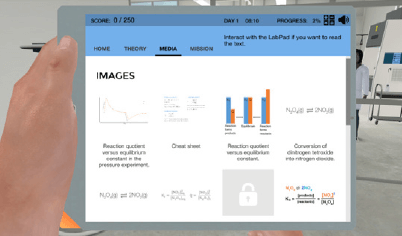 July 2, 2021. We have
enrolled on a partnership
with Labster to offer our
students a hands-on experience
before they enter a lab
in real life, allowing them to
contextualize their learning.
Labster gives our students
theory and practice in
a virtual lab environment.
Virtual labs give our students flexibility. They can do the simulation
as many times as they need, stop and start over when they
have the time.
Ways our students can profit from Labster:
• Lab Reports. See example: https://get.labster.
com/e/723743/dx6u9mQiXksOE-view-usp-sharing/
hdx8n/446267129?h=24hB0dZB-D2kiUPq6bjZ1v1FzhzJVyDj3C6fKLTP-0w
• A library of thousands of Science Images.
• 3D Science Animations
See example: https://get.labster.com/e/723743/Rvk-rEqR6Js/
hdx8q/446267129?h=24hB0dZB-D2kiUPq6bjZ1v1FzhzJVyDj3C6fKLTP-0w
• Blank Quizzes.
• Simulations: 38 new Virtual Lab Simulations.
https://get.labster.com/e/723743/tHgRcSlu3CPZi-view-usp-sharing/
hdx8l/446267129?h=24hB0dZB-D2kiUPq6bjZ1v1FzhzJVyDj3C6fKLTP-0w
July 2, 2021. We have
enrolled on a partnership
with Labster to offer our
students a hands-on experience
before they enter a lab
in real life, allowing them to
contextualize their learning.
Labster gives our students
theory and practice in
a virtual lab environment.
Virtual labs give our students flexibility. They can do the simulation
as many times as they need, stop and start over when they
have the time.
Ways our students can profit from Labster:
• Lab Reports. See example: https://get.labster.
com/e/723743/dx6u9mQiXksOE-view-usp-sharing/
hdx8n/446267129?h=24hB0dZB-D2kiUPq6bjZ1v1FzhzJVyDj3C6fKLTP-0w
• A library of thousands of Science Images.
• 3D Science Animations
See example: https://get.labster.com/e/723743/Rvk-rEqR6Js/
hdx8q/446267129?h=24hB0dZB-D2kiUPq6bjZ1v1FzhzJVyDj3C6fKLTP-0w
• Blank Quizzes.
• Simulations: 38 new Virtual Lab Simulations.
https://get.labster.com/e/723743/tHgRcSlu3CPZi-view-usp-sharing/
hdx8l/446267129?h=24hB0dZB-D2kiUPq6bjZ1v1FzhzJVyDj3C6fKLTP-0w
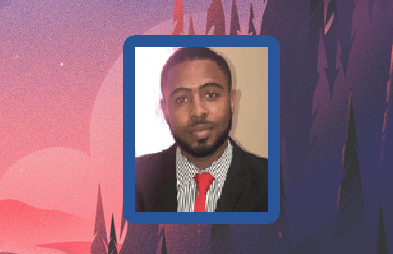 July 9, 2021. Atlantic International
University is
delighted once again to share
the Thesis Defense of one of
our students, Romario Dane
Austin Wright.
Romario recently presented
his thesis defense which was
graded with an A. His thesis
was titled, “To what extent
does Organizational Behavior
affect both internal and external
stakeholders in Jamaica in
achieving the set targets of the
organization over a period of
five (5) to ten (10) years?”.
Romario explained that
the rational for this research
is to analyze the factors that
contribute to the behavior of
individuals and groups within
an organization and how it
affects the organization in the
long term.
Romario Dane Austin
Wright completed a Doctorate
program with a major in
Organizational Leadership
and Management at Atlantic
International University.
July 9, 2021. Atlantic International
University is
delighted once again to share
the Thesis Defense of one of
our students, Romario Dane
Austin Wright.
Romario recently presented
his thesis defense which was
graded with an A. His thesis
was titled, “To what extent
does Organizational Behavior
affect both internal and external
stakeholders in Jamaica in
achieving the set targets of the
organization over a period of
five (5) to ten (10) years?”.
Romario explained that
the rational for this research
is to analyze the factors that
contribute to the behavior of
individuals and groups within
an organization and how it
affects the organization in the
long term.
Romario Dane Austin
Wright completed a Doctorate
program with a major in
Organizational Leadership
and Management at Atlantic
International University.
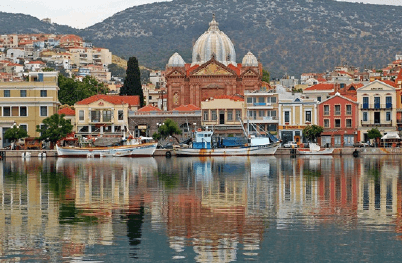 Call for Papers
This Conference will be held
20-22 June 2022
at University of the Aegean -
Department of Mediterranean
Studies, Rhodes, Greece.
We invite proposals for paper
presentations, workshops/
interactive sessions, posters/
exhibits, colloquia, focused
discussions, innovation
showcases, virtual posters, or
virtual lightning talks.
2022 Special Focus:
“Is Publishing as Critical Infrastructure?
Innovation, Creativity,
and Resilience in an
Age of Artificial Intelligence”
Theme 1: Information
Foundations.
Theme 2: Mediums of
Disruption.
Theme 3: Social History and
Impacts.
Become a Presenter:
1. Submit a proposal
2. Review timeline
3. Register
Advance proposal deadline
August 20, 2021
Advance registration deadline
September 20, 2021
Visit the website:
https://informationmediumsociety.
com
Call for Papers
This Conference will be held
20-22 June 2022
at University of the Aegean -
Department of Mediterranean
Studies, Rhodes, Greece.
We invite proposals for paper
presentations, workshops/
interactive sessions, posters/
exhibits, colloquia, focused
discussions, innovation
showcases, virtual posters, or
virtual lightning talks.
2022 Special Focus:
“Is Publishing as Critical Infrastructure?
Innovation, Creativity,
and Resilience in an
Age of Artificial Intelligence”
Theme 1: Information
Foundations.
Theme 2: Mediums of
Disruption.
Theme 3: Social History and
Impacts.
Become a Presenter:
1. Submit a proposal
2. Review timeline
3. Register
Advance proposal deadline
August 20, 2021
Advance registration deadline
September 20, 2021
Visit the website:
https://informationmediumsociety.
com
| Pablo Javier Chami Bachelor of International Business International Business Argentina |
John Chuol Muon Doctor of International Relations International Relations Australia |
Yunji Wilson Yai Master of Science Geomatics Engineering Cameroon |
Sylvie Tabi Ojong Master of Education Education Cameroon |
Ntui Ebot Gabriel Doctor of Science Reproductive Clinical Science Cameroon |
Olufemi Ayoola Olawale Doctor of Philosophy Organizational Leadership Canada |
||||||
| José Daniel Barrera Sáez Doctor of Business Administration Business Administration Chile |
Álvaro Marcelo Contreras Marambio Bachelor of Business Administration Business Administration Chile |
Alvaro Hernando Rincón Trujillo Bachelor of Business Administration Business Administration Colombia |
Yelitza Indira Caicedo Ramos Master of Education Education and Natural Science Colombia |
Carlos Ernesto Guerra Nieto Doctor of Business Administration Strategic Planning Colombia |
Henry Doria Doria Master of Computer Engineering Computer Information Systems Colombia |
||||||
| Bruce Luaba Mudibi Master of Project Management Project Management Congo (DRC ) |
Eugenia Coto López Doctor of Education Methods of Investigation Costa Rica |
Pablo Henriquez Severino Doctor of Latin America Literature Latin American Literature Dominican Republic |
Maribel Gil Vilorio Master of English Education English Teaching Dominican Republic |
Rodolfo Michael Tavárez Fernández Master of Telecommunications Telecommunications Dominican Republic |
Francisco Javier Mora Espín Bachelor of Science Computer Science and Systems Engineering Ecuador |
||||||
| Rogelio Ricardo Jimenez Yepez Bachelor of Science Agronomy Engineering Ecuador |
Juan Alberto Salinas Hernandez Master of Business Management Business Management El Salvador |
Samba Juma Jallow Bachelor of Science Public Health and Nutrition Gambia |
Vicente Bracho Garay Bachelor of Communication Communication Germany |
Raymundo Rodríguez Baeza Doctor of Science Strategic Planning vvGuatemala |
Alvaro Leonel Vásquez Berganza Bachelor of Science Civil Engineering Guatemala |
||||||
| Ernestina Amparo Polanco Girón Bachelor of Business Administration Business Administration Guatemala |
Kaysha Camillia Dixon Wright Master of Education Educational Administration Jamaica |
Ian Leonard Emanuel Doctor of Philosophy Organizational Behavior Jamaica |
Maxwell Ntchentche Bachelor of Financial Accounting Accounting Malawi |
Kampila Humphreys Nsona Doctor of Science Globa l Health Malawi |
Myriam Oropeza Morales Bachelor of Business and Economics Management and Direction Mexico |
||||||
| Iván Cruz Cruz Pedraza Doctor of Public Health Public Health Mexico |
Hendro Jenuve de Júlio Muchiguere Doctor of Business Administration Business Management Mozambi que |
Enna Gumbs Master of Science Counseling Namibia |
Serah Jacob Anzaku Bachelor of Science Human Resource Management Nigeria |
Olanrewaju Kazeem Bakinson Doctor of Science Public Administration Nigeria |
Ishaku Ardo Buba Master of Science Agriculture Marketing Nigeria |
||||||
| Obaroh, Rebbecca Yemi Bachelor of Human Resources Human Resources Nigeria |
Leonard Michael Onyinyechi Aminigbo Doctor of Philosophy Geospatial Information Systems Nigeria |
Okoro Roli Ego Doctor of Philosophy Public Administration Nigeria |
Victor Ogoegbunam Obimma Doctor of Philosophy Project Management Nigeria |
Awuzie Ozioma Kaosisochukwu Certificate of Science Health Science Nigeria |
Rafey A Siddiqui Doctor of Science Water Policy and Management Pakistan |
||||||
| Melva Alvarado Pineda Doctor of Education Research Panama |
Gregory Mario Gilbert Monfardino Bachelor of Science Diet and Nutrition Panama |
Demetrio Cabrera Román Doctor of Science Public Health Peru |
Nicanor Williams Pacheco Huamán Doctor of Science Mechanical Engineering Peru |
Leonel Meléndez Soler Bachelor of Accounting Accounting and Finance Puerto Rico USA |
Jacqueline Martinez Irizarry Doctor of Education Education Puerto Rico |
||||||
| Rafael Eduardo Ruiz Colón Doctor of Psychology Psychology Puerto Rico |
Aulio Anselmo Hernandez De Aza Bachelor of Science Civil Engineering Puerto Rico |
Stephanie Lizanne King Master of Education Educational Management Saint Lucia |
Summia Naveed Master of Science Nutrition Science Saudi Arabia |
Mohamoud Abdi Ahmed Doctor of Education Education Somalia |
Lefora France Mafete Doctor of Business Administration Business Administration South Africa |
||||||
| Genis Tosquella Santanyes Bachelor of Business Administration Business Administration Spain |
Luis Alberto Sánchez Guerra Bachelor of Science Anti-Terrorism Security Spain |
María del Pilar Abollado Amo Bachelor of Business Administration Business Administration Spain |
Fabian Leonard Bergen Bachelor of Science Mechanical Engineering Suriname |
Mbuso Mabuza Doctor of Public Health Epidemiology and Health Innovations Swaziland |
Robinson Ogwang Doctor of Business Administration Business Administration Uganda |
||||||
| Josephine Onyia Doctor of Education Educational Administration United Arab Emirates |
Wiltfer Mauricio Ordóñez Delgado Bachelor of Arts Arts and Paint United Arab Emirates |
Patrick Gregory Henry Bachelor of Science Refrigeration and Airconditioning United Kingdom |
Annabell Zavala Zavala Bachelor of Arts Languages USA |
Laura Yuranny Bocanegra Orozco Bachelor of Science Psychology USA |
Naveed Ahmad Bachelor of Science Computer Science USA |
||||||
| Alvaro Passaro Ferrari Doctor of Philosophy Psychology USA |
Maria Elena Zegarra Vasquez Master of Science Biotechnology USA |
Fidelis Ngochia Bachelor of Science Occupational Safety and Health USA |
Marvin Leal Hurtado Bachelor of Science Architecture USA |
Joiran Ibrahin Ruiz Castillo Master of Science Civil Engineering Venezuela |
Geroge Thole Bachelor of Science Animal Science Zimbabwe |
||||||


Introduction
There are varying definitions
and terminologies for the
words Education and Human
Right. Human Rights Activist,
Malcolm X refers to Education
as “...our passport to the
future, for tomorrow belongs
to the people who prepare
for it today” while Theoretical
Physicist, Albert Einstein
refers to Education as “...not
the learning of facts, but the
training of the mind to think”.
Meanwhile, a UNESCO website
article (November, 2020)
entitled ‘What do you need to
know about the right to education’
affirms that the “Universal
Declaration of Human Rights
affirms that education is a
fundamental human right for
everyone and this right was
further detailed in the Convention
against Discrimination in
Education.” (UNESCOs Website).
The United Nations also refers
to the word Education, in its
definition as a Human Right “...
A Human right includes; the
right to work and education,
and many more.” The essence
of this essay is to delve into the
various arguments and laws that support the notion of education
as a human right as well
as to cite some of the inequalities
faced by human-beings in
terms of their inability to access
quality education despite
decades of advocacy.
Is education
a Human Right?
Many proponents will
deliberate whether education
is a human right. The position
taken in this paper is to use
the empirical data gathered,
to form the basis for arriving
at a consensus on the subject
matter. The United Nations
Educational Scientific Cultural
Organization (UNESCO) declares
that “Education is a Human
Right for all, throughout
life and that access must be
matched by quality.” Education,
as a fundamental human
right lies at the heart of UNESCO’s
mission and is enshrined
in the Universal Declaration
of Human Rights (1948) and
many other international human
rights instruments. The
right to education is one of the
key principles underpinning
the Education 2030 Agenda
and Sustainable Development
Goal 4 (SDG4), adopted by the
international community. SDG
4 which speaks to ‘Quality
Education’ is rights-based
and seeks to ensure the full
enjoyment of the right to
education as fundamental to
achieving sustainable development.
It also aims to ensure
and promote inclusive and
equitable quality education for
all.” (UNESCO website). In addition,
we can fuse the terms
Education and Human Right
for a better understanding. For
instance, even on the Atlantic
International University
(AIU) website, www.aiu.edu, a
correlation of both words has
been mentioned “Education
is a Human Right, it brings
freedom and opportunity.”
From these several academic
articles and instruments
that support the human right
principles, one could concur
that education is in fact a human
right.
The power of education
as a Human Right
Education is a human
right and a force for sustainable
development and peace.
Every Sustainable Development
Goal (SDG) in the 2030
Agenda requires education
to empower people with the
knowledge, skills and values
to live in dignity, build their
lives and contribute to their
societies. (UNESCO’s website
– Leading SDG 4 – Education
2030). In addition, UNESCO
further reaffirms that the
power of education is in fact
a human right; “Education in
itself is an empowering right
and one of the most powerful
tools by which economically
and socially marginalized
children and adults can lift
themselves out of poverty and
participate fully in society.”
(Retrieved from UNESCO
website). Consequently, the
role of education has to be
seen as a ‘human right’ by all,
in relation to communicating
the mandate of the Education
2030 Agenda.
It is in this context, that I
refer to a famous quote from
Former South African President,
Nelson Mandela which
underscores the power of
education in changing the
world; Mandela posited that
“Education is the most powerful
weapon which you can use
to change the world.”
Some socio-economic
inequalities of education
as a Human Right
There are several socio-economic
inequalities pertaining
to education and human rights
globally. Highlights of the
UNESCO’s Global Caribbean
Report entitled Inclusion and
Education in Latin America
and the Caribbean outlines
some of these inequalities
across different spheres:
—UNESCO’s Global Caribbean
Report on Inclusion and
Education in Latin America
and the Caribbean offers some
insights pertaining to the core
challenges and key solutions
for greater inclusion, in a
region characterized by the
largest and most challenging
socio-economic inequalities of
education as a Human Right.
Caribbean region is considered the largest and
most challenging socio-economic
inequality in the world.
Some of the key findings of
the Report revealed that;
Latin America and the Caribbean
is committed to data
use, but there is room for improvement.
Surveys are key
for disaggregating education
indicators by individual characteristics
but 57% of countries
in the region, mostly in
the Caribbean, representing
13% of the region’s population,
do not make survey data
available.
Teachers need more
support to embrace diversity.
Continuous professional development
opportunities are
often unavailable, although
70% of countries in the region
provide for teacher training,
on inclusion in laws or
policies. Over 50% of teachers
in Brazil, Colombia and
Mexico reported a high need
for professional development
on teaching students with
special needs. In terms of
children with disabilities, the
impact of inequality is even
greater; school attendance
rates are lower for young
people with disabilities, indigenous
language speakers and
Afro-descendants.
In addition, due to the
adverse effects of COVID-19
on the education systems,
the pandemic is economic
inequalities in the world.
The Report further stated that;
“Latin America and the deepening
the education crisis and
widening existing educational
inequalities. (UNESDOC Digital
Library).
Education under
Human Rights Law
Education is embedded as a
Human Right under the Universal
Declaration of Human
Rights (UDHR) established by
the United Nations General Assembly
on December 10, 1948.
Article 26 of the document
outlined that; “Everyone has
the right to education. Education
shall be free, at least in the
elementary and fundamental
stages.” The Human Right Laws
are entrenched in laws of several
countries. An article from
the UNESDOC Digital Library
website states that; “Many
countries in the region have
adopted a broad perspective
on inclusion in national laws,
although most tend to focus
laws on specific groups. In 95%
of countries, education ministries
have issued laws focused
on people with disabilities.
For Instance, Jamaica, the first
signatory of the Convention on
the Rights of Persons with Disabilities,
approved its Disability
Act in 2014;” It states that no
education institution shall
deny enrolment to a person
with disabilities”.
Conclusion
Education is not a privilege,
but a human right that
is inclusive. According to an
article on the UNESCO website;
Human rights are at the heart
of the Sustainable Development
Goals (SDGs), as in the absence
of human dignity, we cannot
hope to drive sustainable development.
In keeping with the
fundamental principle of the
UNESCO’s Sustainable Development
Goals (SDGs) to ‘Leave
No-one Behind’, it is imperative
that Governments and other
key stakeholders continue to
promulgate the dialogue of ensuring
the attainment of ‘quality
education to all’ by 2030.
Finally, I invite you to
view the link below for an
inspiring educational-related
story entitled “My sister, A
Teacher and a Hero for Girls”
which was aired on Human
Rights Day 2020. https://
www.hrw.org/news/2020/12/10/
my-sister-teacher-and-hero-girls.
REFERENCES. www.aiu.edu (Atlantic University International website)
Global Education Monitoring Report https://unesdoc.unesco.org/ark:/48223/
pf0000374790 | Right To Education https://en.unesco.org/themes/right-to-education |
2020 Latin America and the Caribbean Report —Inclusion and Education
https://en.unesco.org/gem-report/LAC2020inclusion | Leading SDG 4 – Education
2030 https://en.unesco.org/themes/education2030-sdg4 | What do you need to
know about the right to education (November 2020). https://en.unesco.org/
news/what-you-need-know-about-right-education | Universal Declaration of Human
Rights (Claiming Rights) http://www.claiminghumanrights.org/udhr_article_26.
html | Universal Declaration of Human Rights https://www.un.org/en/universaldeclaration-
human-rights/ https://unesdoc.unesco.org/ | YouTube Video https://www.
hrw.org/news/2020/12/10/my-sister-teacher-and-hero-girls

Thinking, speaking of
evaluation: teachers,
advisors, students express
themselves —My God! Assessment
is one of the key aspects
of education at any level. We
know that in formal education
they are important: Philosophy,
Policies, Curriculum
Design and together with Curricular
Design: the application
and exit of the students. The
Instrumentation work of any
study ends with an evaluation.
Formal education aims for
human beings to learn and
also to build a society for their
well-being and the well-being
of all. Learning assessment becomes
a concern and occupation
of teachers and students
because it depends on it: for
a teacher or advisor, I do
my job well; for the student,
nothing more and nothing
less, than their certification or
graduation
For the Advisor or teacher, assessment is a strong responsibility
because what he or
she says is good, in terms of
science, he or she will have to
answer to society for the quality
of the professional practice
of those human beings who
are his her students.
For the student it’s also a
responsibility because their
professional practice in one
way or another means lives.
Human beings to grow —Human
beings to be happy.
Assessment is a problem
when it’s not clear what a
student has to do in order
to be able to say: they did
acquire this or that knowledge.
The problem arises
when establishing the types of
knowledge.
It also stems from having to
determine what skills this or
the other student has when
they start their program. It’s also a concern for the
student because he or she
questions how much I know
to finish this degree.
From the aforementioned is
where the conflicts arise when
evaluating: for the Advisor
and for the student.
We searched the evaluation
literature and found different
currents: some give value to
these theoretical principles
and others to those.
After reading the previous
lines, if you are a student or
Academic Advisor at Atlantic
International University
(AIU) you are left thinking, but
we are Andragogic University.
Yes, it’s adult education,
which means that you are an
adult to be responsible for
yourself and that: you are
looking for adequate indications
to know that you are
admitted into the community
of those who know Science at
the level you have chosen
Assessment is:
1. Demarcation of the object.
What is being talked about
using the concepts of that
Science
2. Use of criteria related to
science. Application of
theoretical concepts of this
area of knowledge
3. Use of science systems. Use
of methods and techniques
from that area of knowledge
4. Representation of the object
of study. Realization of
models based on procedures
of the science being studied.
5. Issuance of judgments. Explain
how it can be applied.
They are the Conclusions
and Recommendations.
6. Decision making. The
Application, which at AIU
you make it applied to your
Community, National and
International
It is what we must do as
Academic Advisors and as
students. As an Academic
Advisor, it’s what I look for
in what the student presents
to me. As a student it’s what I
have to present.
Nowadays, when we talk
about assessment, we have the
following that correspond to
different stages of learning:
1. Initial or Diagnostic
Assessment.
2. Formative Assessment
3. Summative Assessment
1. Initial or Diagnostic
Assessment
The purpose of the Initial
Assessment is to know the
level that the student has in
terms of theoretical knowledge,
methods, procedures
and techniques of the science
of which he or she wants a
social accreditation or degree.
At AIU you are asked for
your autobiography with that
purpose.
2. Formative Assessment
The Formative Assessment
refers to the use of the concepts,
procedures, methods
and techniques of the science
being studied.
3. Summative Assessment
The Summative Assessment
shows the degree that the student
reached of the learning
that was necessary according
to the university.
The accreditation before
society is the title that says
that the student has the
competencies to carry out the
activities in the area. The Assessment
for Advisors, in the
case of AIU and students, is a
moral commitment as well as
an academic one. It’s a moral
commitment because from my
criteria about what a human
being is and what society is,
we will carry out our work.
As an Advisor, it’s necessary
to tell the student: you need to
investigate this aspect or the
other. As a student you should
ask the Advisor: am I good at
what I’m doing?
We can have the infrastructure
that we want but if there
is no ethics with what we
give to the students and what
the students have to give,
the work of both becomes
very uncomfortable in any
institution.
The evaluation is an
ethical activity because the
Advisor should not accredit
what is not in accordance
with science and the student
should not expect to be
accredited what is different
from the methods and procedures
of the science he or she
is studying.
We were born to create a
society that allows us to fulfill
ourselves as human beings by
being an Advisor, a student
or whatever activity we have
chosen. The world we want is
in ourselves.
BIBLIOGRAPHY. Organización de las Naciones Unidas para la Educación, la Ciencia y la Cultura (UNESCO).
Objetivos de Desarrollo Sostenible. Educación Superior. https://es.unesco.org/themes/educacion-superior/ods
 Bottom-up processing is an explanation
for perceptions that start
with an incoming stimulus and working
upwards until a representation of
the object is formed in our minds. This
process suggests that our perceptual
experience is based entirely on the
sensory stimuli that we piece together
using only data that is available from
our senses.
In order to make sense of the world,
we must take in energy from the
environment and convert it to neural
signals, a process known as sensation.
It is in the next step of the process,
known as perception, that our brains
interpret these sensory signals.
How exactly do people process
perceptual information from the world
around them? There are two basic approaches
to understanding how this
sensation and perception takes place.
One of these is known as bottom-up
processing and the other is known as
top-down processing.
Bottom-Up: Data driven • Focuses
on incoming sensory data • Takes
place in real time. Top-Down: Info
is interpreted using contextual clues
• Uses previous experience and
expectations.
Bottom-up processing can be defined
as sensory analysis that begins at
the entry-level —with what our senses
can detect. This form of processing
begins with sensory data and goes up
to the ...
Read full text:
Bottom-up processing is an explanation
for perceptions that start
with an incoming stimulus and working
upwards until a representation of
the object is formed in our minds. This
process suggests that our perceptual
experience is based entirely on the
sensory stimuli that we piece together
using only data that is available from
our senses.
In order to make sense of the world,
we must take in energy from the
environment and convert it to neural
signals, a process known as sensation.
It is in the next step of the process,
known as perception, that our brains
interpret these sensory signals.
How exactly do people process
perceptual information from the world
around them? There are two basic approaches
to understanding how this
sensation and perception takes place.
One of these is known as bottom-up
processing and the other is known as
top-down processing.
Bottom-Up: Data driven • Focuses
on incoming sensory data • Takes
place in real time. Top-Down: Info
is interpreted using contextual clues
• Uses previous experience and
expectations.
Bottom-up processing can be defined
as sensory analysis that begins at
the entry-level —with what our senses
can detect. This form of processing
begins with sensory data and goes up
to the ...
Read full text:
 Horror films were wildly popular
on streaming platforms over the
past year, and 2020 saw the horror
genre take home its largest share of the
box office in modern history. In a year
where the world was stricken by real
horrors, why were many people escaping
to worlds full of fictional horrors?
As odd as it may sound, the fact that
people were more anxious in 2020 may
be one reason why horror films were
so popular. A look at typical horror
fans may provide some clues about the
nature of this peculiar phenomenon.
For example, horror fans often
mention their own anxiety and how
horror helps them deal with it. They
may be more of an anxious bunch
than a fearless bunch. In a recent
study, posted on PsyArXiv, researchers
looked at plot keywords from
over 800 films and nearly 1 million
Facebook likes. They found that fans
of horror movies were more likely to
be high in neuroticism —a personality
trait characterized by high anxiety.
Across all movies in the dataset, plot
keywords such as “mental illness,”
“ghost,” “serial killer,” and “insanity”
were among the strongest predictors
of fans’ neuroticism. Likewise, movie
plots with psychological themes of
death and anxiety predicted high neuroticism
among fans of those movies.
Read full text:
Horror films were wildly popular
on streaming platforms over the
past year, and 2020 saw the horror
genre take home its largest share of the
box office in modern history. In a year
where the world was stricken by real
horrors, why were many people escaping
to worlds full of fictional horrors?
As odd as it may sound, the fact that
people were more anxious in 2020 may
be one reason why horror films were
so popular. A look at typical horror
fans may provide some clues about the
nature of this peculiar phenomenon.
For example, horror fans often
mention their own anxiety and how
horror helps them deal with it. They
may be more of an anxious bunch
than a fearless bunch. In a recent
study, posted on PsyArXiv, researchers
looked at plot keywords from
over 800 films and nearly 1 million
Facebook likes. They found that fans
of horror movies were more likely to
be high in neuroticism —a personality
trait characterized by high anxiety.
Across all movies in the dataset, plot
keywords such as “mental illness,”
“ghost,” “serial killer,” and “insanity”
were among the strongest predictors
of fans’ neuroticism. Likewise, movie
plots with psychological themes of
death and anxiety predicted high neuroticism
among fans of those movies.
Read full text:
 Matter and anti-matter are always
thought of as opposites. If they
interact, they turn into pure energy.
But there are cases, thanks to the peculiar
laws of quantum mechanics, where
particles and antiparticles are somewhat
coexisting. Now, a new particle
can be added to those cases.
Physicists report that the charm meson
(subatomic particle that contains
a quark and an antiquark, with one of
them being of the charm type) D0 can
be found in a superposition state of its
particle —made of one charm quark
and an up antiquark— and its antiparticle,
which is made of one charm
antiquark and an up quark. This is the
fourth particle known to be able to do
that after the strange-beauty mesons
oscillations discovered decades ago.
The findings, submitted for publication
in Physical Review Letters and
available as a preprint at arXiv, are yet
to be peer-reviewed.
“Charm meson particles are produced
in proton–proton collisions
and they travel on average only a few
millimetres before transforming, or
decaying, into other particles,” Professor
Tim Gershon at the University of
Warwick, developer of the analytical
technique used to make the measurement,
said in a statement.
“By comparing the charm meson particles
that decay after travelling a short
distance with those ...
Matter and anti-matter are always
thought of as opposites. If they
interact, they turn into pure energy.
But there are cases, thanks to the peculiar
laws of quantum mechanics, where
particles and antiparticles are somewhat
coexisting. Now, a new particle
can be added to those cases.
Physicists report that the charm meson
(subatomic particle that contains
a quark and an antiquark, with one of
them being of the charm type) D0 can
be found in a superposition state of its
particle —made of one charm quark
and an up antiquark— and its antiparticle,
which is made of one charm
antiquark and an up quark. This is the
fourth particle known to be able to do
that after the strange-beauty mesons
oscillations discovered decades ago.
The findings, submitted for publication
in Physical Review Letters and
available as a preprint at arXiv, are yet
to be peer-reviewed.
“Charm meson particles are produced
in proton–proton collisions
and they travel on average only a few
millimetres before transforming, or
decaying, into other particles,” Professor
Tim Gershon at the University of
Warwick, developer of the analytical
technique used to make the measurement,
said in a statement.
“By comparing the charm meson particles
that decay after travelling a short
distance with those ...
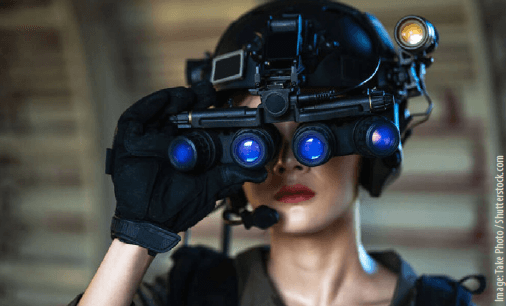 Being able to see in the dark has
many advantages, like stealth
mode or never stubbing your toe or
banging your knee in the night again.
However, the closest we humans are
going to get to this superpower is night
vision goggles. These already exist,
they’ve been around a while, you
may be thinking —but scientists have
recently developed an ultra-thin film
that could be applied to regular glasses
to turn them into night vision goggles.
Huzzah, night vision goggles for all.
Though still a proof-of-concept,
a team of Australian and European
scientists has detailed in the journal
Advanced Photonics how the transparent
film can convert infrared light
—normally invisible to the human
eye— into visible light. One of the
applications of this is that applied
to standard lightweight glasses, they
could replace current bulky, heavy
military-style night-vision goggles.
“We have made the invisible visible,”
lead researcher Dr Rocio Camacho
Morales of the Australian National
University, said in a statement. “We've
made a very thin film, consisting of
nanometre-scale crystals, hundreds of
times thinner than a human hair, that
can be directly applied to glasses and
acts as a filter, allowing you to see in
the darkness of the night.” ...
Read full text
Being able to see in the dark has
many advantages, like stealth
mode or never stubbing your toe or
banging your knee in the night again.
However, the closest we humans are
going to get to this superpower is night
vision goggles. These already exist,
they’ve been around a while, you
may be thinking —but scientists have
recently developed an ultra-thin film
that could be applied to regular glasses
to turn them into night vision goggles.
Huzzah, night vision goggles for all.
Though still a proof-of-concept,
a team of Australian and European
scientists has detailed in the journal
Advanced Photonics how the transparent
film can convert infrared light
—normally invisible to the human
eye— into visible light. One of the
applications of this is that applied
to standard lightweight glasses, they
could replace current bulky, heavy
military-style night-vision goggles.
“We have made the invisible visible,”
lead researcher Dr Rocio Camacho
Morales of the Australian National
University, said in a statement. “We've
made a very thin film, consisting of
nanometre-scale crystals, hundreds of
times thinner than a human hair, that
can be directly applied to glasses and
acts as a filter, allowing you to see in
the darkness of the night.” ...
Read full text
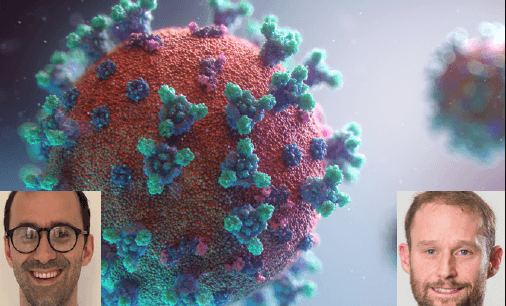 The gene, which is identified as
HLA-DRB1*04:01, is found three
times more often in those who are
asymptomatic with the virus. This
suggests that those who have this gene
benefit from some level of protection
from severe Covid-19.
A scientific/medical team at Newcastle
University led the way on the study,
which was carried out in collaboration
with NHS trusts ... During the course
of the study, individuals who were
asymptomatic were compared with
patients from the same community who
developed severe Covid-19 but had no
underlying illnesses. Samples were used
from: 1– 49 patients with severe Covid
who had been hospitalised with respiratory
failure; 2– An asymptomatic group
of 69 hospital workers who had tested
positive through routine blood antibody
testing. 3– A control group from
a study into the relationship between
HLA genotypes and the outcomes of
joint replacement surgery. ... A paper
outlining the study’s findings has been
published in the HLA Journal. ...
The gene is directly correlated to
latitude and longitude, which means
that more people in the North and
West of Europe are likely to have it.
Crucially, this means that populations
of European descent will be more
likely to remain asymptomatic, whilst
still transmitting the disease to more
susceptible populations. ...
Read full text:
The gene, which is identified as
HLA-DRB1*04:01, is found three
times more often in those who are
asymptomatic with the virus. This
suggests that those who have this gene
benefit from some level of protection
from severe Covid-19.
A scientific/medical team at Newcastle
University led the way on the study,
which was carried out in collaboration
with NHS trusts ... During the course
of the study, individuals who were
asymptomatic were compared with
patients from the same community who
developed severe Covid-19 but had no
underlying illnesses. Samples were used
from: 1– 49 patients with severe Covid
who had been hospitalised with respiratory
failure; 2– An asymptomatic group
of 69 hospital workers who had tested
positive through routine blood antibody
testing. 3– A control group from
a study into the relationship between
HLA genotypes and the outcomes of
joint replacement surgery. ... A paper
outlining the study’s findings has been
published in the HLA Journal. ...
The gene is directly correlated to
latitude and longitude, which means
that more people in the North and
West of Europe are likely to have it.
Crucially, this means that populations
of European descent will be more
likely to remain asymptomatic, whilst
still transmitting the disease to more
susceptible populations. ...
Read full text:
 The cost of the COVID-19 pandemic
is usually measured in deaths,
sometimes in those hospitalized or affected
by long-Covid. However, there is
at least one horrifying statistic that has
been largely overlooked: the number
of children who have lost people who
previously cared for them, sometimes
leaving them without support. Now
an estimate of that number has been
calculated in The Lancet, and it makes
for some of the bleakest reading of the
whole disaster.
To assess how common this has
been, researchers used the ages of people
who died from COVID-19 between
March 2020 and April 2021 in the 21
countries that made up 77% of total
deaths. Combining this with fertility
data, they calculated how many children
these people had had in the last
18 years, assuming parents were no
more or less susceptible.
Extrapolating to the world as a whole,
the authors estimate more than one
million children have lost one or both
parents directly to COVID-19 or to the
knock-on effects of the virus. Many
more lost grandparents, but restricting
the data to older relatives who
previously lived with the children, and
therefore probably contributed to their
care, the study brings the total to 1.56
million. Almost three months after the
cut-off date, the number has probably
...
Read full text:
The cost of the COVID-19 pandemic
is usually measured in deaths,
sometimes in those hospitalized or affected
by long-Covid. However, there is
at least one horrifying statistic that has
been largely overlooked: the number
of children who have lost people who
previously cared for them, sometimes
leaving them without support. Now
an estimate of that number has been
calculated in The Lancet, and it makes
for some of the bleakest reading of the
whole disaster.
To assess how common this has
been, researchers used the ages of people
who died from COVID-19 between
March 2020 and April 2021 in the 21
countries that made up 77% of total
deaths. Combining this with fertility
data, they calculated how many children
these people had had in the last
18 years, assuming parents were no
more or less susceptible.
Extrapolating to the world as a whole,
the authors estimate more than one
million children have lost one or both
parents directly to COVID-19 or to the
knock-on effects of the virus. Many
more lost grandparents, but restricting
the data to older relatives who
previously lived with the children, and
therefore probably contributed to their
care, the study brings the total to 1.56
million. Almost three months after the
cut-off date, the number has probably
...
Read full text:
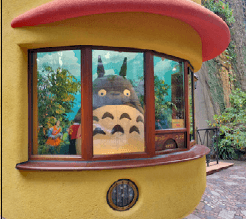 Earlier this year, it had been
reported that the Studio Ghibli
Museum in Japan had taken a considerable
financial hit, with the pandemic
preventing visitors from visiting the
establishment.
Last week, the city of Mitaka in
Tokyo launched a crowdfunding campaign,
requesting donations of US$45,
which could be used as tax write-offs.
In just the first 24 hours, the city’s goal
of US$90,000 was reached, with the
campaign garnering over US$200,000
to date, as per ANN. The campaign will
continue running for 197 days.
According to Kotaku, the museum
was shuttered temporarily from February
to July last year, due to COVID-19.
This year, it was closed again from
April to June, incurring even more
revenue loss. ...
Earlier this year, it had been
reported that the Studio Ghibli
Museum in Japan had taken a considerable
financial hit, with the pandemic
preventing visitors from visiting the
establishment.
Last week, the city of Mitaka in
Tokyo launched a crowdfunding campaign,
requesting donations of US$45,
which could be used as tax write-offs.
In just the first 24 hours, the city’s goal
of US$90,000 was reached, with the
campaign garnering over US$200,000
to date, as per ANN. The campaign will
continue running for 197 days.
According to Kotaku, the museum
was shuttered temporarily from February
to July last year, due to COVID-19.
This year, it was closed again from
April to June, incurring even more
revenue loss. ...
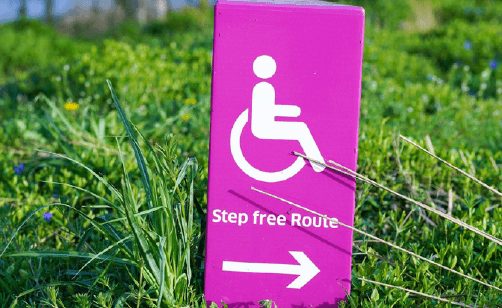 While there are definite differences
in the approach of inclusive
and accessible design, there are also a
lot of similarities. Both are tools that
empower designers to create digital
products that can be used by the largest
group of people, regardless of their
current circumstances.
Accessible design and inclusive design
work hand in hand to lower barriers
that exclude people from using digital
products effectively. These barriers
are often created inadvertently during
the design process when designers create
products for people like themselves.
By employing inclusive design methodology
and empathizing with diverse
groups of people, designers can create
products that are accessible to all.
One way that both inclusive design
and accessible design can improve
is to learn from the ways real people
adapt to technological barriers in a
given context. By studying the ways
people have found to adapt to situations,
designers can create better
solutions. If, for example, a person
uses text-to-speech to listen to an
article when they aren’t able to read
it (either because of a situation or a
disability), designers could provide an
audio version.
Every designer, regardless of their
specialty, should aim to create digital
products that can be used by the widest
range of people. ...
Read full text:
While there are definite differences
in the approach of inclusive
and accessible design, there are also a
lot of similarities. Both are tools that
empower designers to create digital
products that can be used by the largest
group of people, regardless of their
current circumstances.
Accessible design and inclusive design
work hand in hand to lower barriers
that exclude people from using digital
products effectively. These barriers
are often created inadvertently during
the design process when designers create
products for people like themselves.
By employing inclusive design methodology
and empathizing with diverse
groups of people, designers can create
products that are accessible to all.
One way that both inclusive design
and accessible design can improve
is to learn from the ways real people
adapt to technological barriers in a
given context. By studying the ways
people have found to adapt to situations,
designers can create better
solutions. If, for example, a person
uses text-to-speech to listen to an
article when they aren’t able to read
it (either because of a situation or a
disability), designers could provide an
audio version.
Every designer, regardless of their
specialty, should aim to create digital
products that can be used by the widest
range of people. ...
Read full text:
 Milan-based start-up Krill Design
has 3D printed Sicilian orange
peels into a tactile lamp that can be
composted along with organic household
waste. The designers turned to
orange peel to create the lightweight
lamp because of the citrus fruit’s ubiquity
in Sicily, Italy. Each lamp is made
from the discarded peels of two or
three oranges sourced from a familyowned
food producer in the Messina
province of Sicily.
The designers hope the lamp
demonstrates how food waste can be
successfully repurposed into an ecodesign
product that is both beautiful
and functional. “The orange lamp, at
the end of its life, can simply be broken
into fragments and tossed with the
household's organic waste to be disposed
of in composting facilities and
be turned either into compost or biofuel
depending on local dispositions,” ...
Read full text:
Milan-based start-up Krill Design
has 3D printed Sicilian orange
peels into a tactile lamp that can be
composted along with organic household
waste. The designers turned to
orange peel to create the lightweight
lamp because of the citrus fruit’s ubiquity
in Sicily, Italy. Each lamp is made
from the discarded peels of two or
three oranges sourced from a familyowned
food producer in the Messina
province of Sicily.
The designers hope the lamp
demonstrates how food waste can be
successfully repurposed into an ecodesign
product that is both beautiful
and functional. “The orange lamp, at
the end of its life, can simply be broken
into fragments and tossed with the
household's organic waste to be disposed
of in composting facilities and
be turned either into compost or biofuel
depending on local dispositions,” ...
Read full text:
 Investigating the effects of coffee on
how the kidneys regulate calcium in
the body, researchers found that high
doses of caffeine (800 mg) consumed
over a six-hour period almost doubled
the amount of calcium lost in the
urine. This is the first study to report
the impact of high-dose, short-term
caffeine intake on renal clearance of
calcium, sodium, and creatinine in
healthy adults.
University of South Australia’s Dr
Hayley Schultz says with the emergence
of an increasing ‘coffee culture’
it’s important for people to understand
the impacts of what they are putting
into their bodies. He said: “Caffeine is
one of the most widely used recreational
drugs in the world, with 80% of adults
consuming at least one caffeinated beverage
per day. It’s a common stimulant,
consumed by professionals, parents,
shift workers, and teenagers alike to
start their day and stay alert —
even the
military use it to help combat sleepiness.
But while coffee has its perks,
it’s also important to acknowledge its
fallbacks —one of them being how our
kidneys handle calcium. ...”
Osteoporosis is a chronic, painful,
and debilitating disease which makes
your bones less dense and more susceptible
to fracture. ...
Investigating the effects of coffee on
how the kidneys regulate calcium in
the body, researchers found that high
doses of caffeine (800 mg) consumed
over a six-hour period almost doubled
the amount of calcium lost in the
urine. This is the first study to report
the impact of high-dose, short-term
caffeine intake on renal clearance of
calcium, sodium, and creatinine in
healthy adults.
University of South Australia’s Dr
Hayley Schultz says with the emergence
of an increasing ‘coffee culture’
it’s important for people to understand
the impacts of what they are putting
into their bodies. He said: “Caffeine is
one of the most widely used recreational
drugs in the world, with 80% of adults
consuming at least one caffeinated beverage
per day. It’s a common stimulant,
consumed by professionals, parents,
shift workers, and teenagers alike to
start their day and stay alert —
even the
military use it to help combat sleepiness.
But while coffee has its perks,
it’s also important to acknowledge its
fallbacks —one of them being how our
kidneys handle calcium. ...”
Osteoporosis is a chronic, painful,
and debilitating disease which makes
your bones less dense and more susceptible
to fracture. ...
 Just about anyone can slip into hyperfocus
mode. But experts say it’s
more common —and happens more
often— in people with ADHD. It may be
because their brains are less sensitive
to a chemical called dopamine, which
is linked to reward and attention. ...
When you get too engrossed in a
task, that tunnel vision can get in the
way of the rest of your life. ... But you
can learn to curb your hyperfocus and
even turn it into an asset.
Some people call hyperfocus the
“superpower” of ADHD. Because you’re
so absorbed in a task, you can get more
done quicker. You may also get better
at it. ... The key is to channel that attention
to useful goals.
You can’t just switch your trait on and off. But you can learn what causes
you to zero in on certain things. Case
in point: You’re likely to lose yourself
only in activities that you find interesting.
In other words, you can set the
stage —or not— for going into hyperfocus
mode. Take note of what grabs your
attention and makes you tune out. Can
you fritter away a whole day shopping
online, or researching historical
trivia? This can help you spot what sets
off your hyperfocus. Once you know,
you can take steps to manage it. Other
people may not know or understand
how easily you can fall into a black
hole. Explain it to them, and ask for
support. ...
Just about anyone can slip into hyperfocus
mode. But experts say it’s
more common —and happens more
often— in people with ADHD. It may be
because their brains are less sensitive
to a chemical called dopamine, which
is linked to reward and attention. ...
When you get too engrossed in a
task, that tunnel vision can get in the
way of the rest of your life. ... But you
can learn to curb your hyperfocus and
even turn it into an asset.
Some people call hyperfocus the
“superpower” of ADHD. Because you’re
so absorbed in a task, you can get more
done quicker. You may also get better
at it. ... The key is to channel that attention
to useful goals.
You can’t just switch your trait on and off. But you can learn what causes
you to zero in on certain things. Case
in point: You’re likely to lose yourself
only in activities that you find interesting.
In other words, you can set the
stage —or not— for going into hyperfocus
mode. Take note of what grabs your
attention and makes you tune out. Can
you fritter away a whole day shopping
online, or researching historical
trivia? This can help you spot what sets
off your hyperfocus. Once you know,
you can take steps to manage it. Other
people may not know or understand
how easily you can fall into a black
hole. Explain it to them, and ask for
support. ...
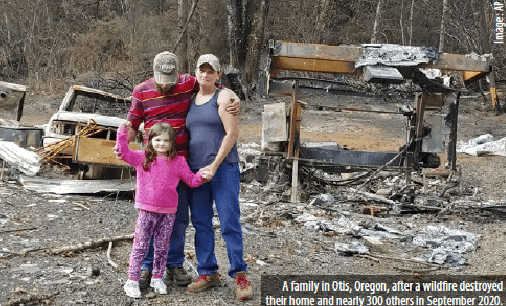 Decisions about where to live, when
we’re lucky enough to have the
ability to choose, are deeply personal
—a function of family, friends, jobs,
wealth and idiosyncratic preferences
about community, health, environment
and yes, climate and weather. But, from
the point of view of a scientist, certain
facts about our changing environment
are now glaringly unambiguous. Sea
levels are rising and risks from coastal
flooding and storms —already extremely
high in some places— are growing
fast. Rising temperatures are already
causing more extreme heat events,
which have always been lethal and
are becoming more so. Wildfires are
increasing in frequency, intensity and
duration in many parts of the world,
threatening communities with death
and destruction and causing severe air
pollution for millions. The severity of
both droughts and floods are on the rise
in some regions, with consequences
for water availability and quality and
public health.
Worldwide, nearly 700 million
people now live in low-lying coastal
zones vulnerable to sea-level rise and
coastal storms. That number could
reach a billion by 2050. Island nations
like the Maldives, Seychelles,
Kiribati and others could be completely
wiped out by rising seas and
storms. Even a rise of only a meter
(39in), almost certainly unavoidable
now, will displace millions of people
in Florida ...
Read full text:
Decisions about where to live, when
we’re lucky enough to have the
ability to choose, are deeply personal
—a function of family, friends, jobs,
wealth and idiosyncratic preferences
about community, health, environment
and yes, climate and weather. But, from
the point of view of a scientist, certain
facts about our changing environment
are now glaringly unambiguous. Sea
levels are rising and risks from coastal
flooding and storms —already extremely
high in some places— are growing
fast. Rising temperatures are already
causing more extreme heat events,
which have always been lethal and
are becoming more so. Wildfires are
increasing in frequency, intensity and
duration in many parts of the world,
threatening communities with death
and destruction and causing severe air
pollution for millions. The severity of
both droughts and floods are on the rise
in some regions, with consequences
for water availability and quality and
public health.
Worldwide, nearly 700 million
people now live in low-lying coastal
zones vulnerable to sea-level rise and
coastal storms. That number could
reach a billion by 2050. Island nations
like the Maldives, Seychelles,
Kiribati and others could be completely
wiped out by rising seas and
storms. Even a rise of only a meter
(39in), almost certainly unavoidable
now, will displace millions of people
in Florida ...
Read full text:
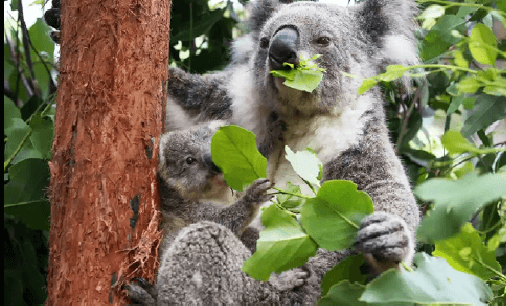 Corporate Australia is familiar with
the concept that climate change
presents a financial risk to the global
economy, but more recently biodiversity
loss has emerged as an equally important
risk. In fact, climate change and
biodiversity loss are now often referred
to as the “twin crises” facing the global
financial system and awareness of the
role the financial sector plays in this is
rising swiftly.
A recent global review on the economics
of biodiversity commissioned by the
UK government ... concluded that our
economic system is dependent on biodiversity.
This fact is rightly of concern
to the financial sector, given the world’s
biodiversity is declining faster than
at any other time in history, and an
estimated 1 million species are at risk of
extinction. Five of the world’s leading
reef and climate scientists say it was
correct for Unesco to recommend the
Great Barrier Reef be listed as world
heritage ‘in danger’. Just last month the
G7 climate and environment ministers
acknowledged “with grave concern that
the unprecedented and interdependent
crises of climate change and biodiversity
loss pose an existential threat to
nature, people, prosperity ...
Read full text
Corporate Australia is familiar with
the concept that climate change
presents a financial risk to the global
economy, but more recently biodiversity
loss has emerged as an equally important
risk. In fact, climate change and
biodiversity loss are now often referred
to as the “twin crises” facing the global
financial system and awareness of the
role the financial sector plays in this is
rising swiftly.
A recent global review on the economics
of biodiversity commissioned by the
UK government ... concluded that our
economic system is dependent on biodiversity.
This fact is rightly of concern
to the financial sector, given the world’s
biodiversity is declining faster than
at any other time in history, and an
estimated 1 million species are at risk of
extinction. Five of the world’s leading
reef and climate scientists say it was
correct for Unesco to recommend the
Great Barrier Reef be listed as world
heritage ‘in danger’. Just last month the
G7 climate and environment ministers
acknowledged “with grave concern that
the unprecedented and interdependent
crises of climate change and biodiversity
loss pose an existential threat to
nature, people, prosperity ...
Read full text
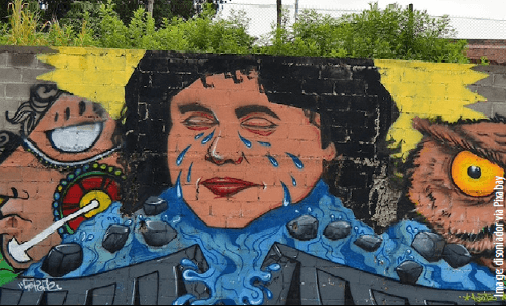 The alleged mastermind of the
2016 killing of environmental
and Indigenous rights activist Berta
Cáceres was convicted of homicide
by a Honduran court on Monday
[July 15]. Cáceres was gunned down
in her home on March 2, 2016 at the
age of 44 after leading opposition
to the Agua Zarca dam, which was
to be built on the Rio Galcarque, a
river that is sacred to the local Lenca
people. Cáceres —herself Lenca— was
the co-founder the National Council
of Popular and Indigenous Organizations
of Honduras (COPINH).
Cáceres was recognized for her
activism against the dam in 2015 when
she won the prestigious Goldman
Environmental Prize. Her subsequent
murder shocked the world and led to
the suspension of the Agua Zarca dam.
Castillo Mejía is the eighth person
to be convicted in the murder. According
to the Associated Press, seven men
were sentenced to prison in December
2019 for their role in the assassination,
receiving terms ranging from 30
to 50 years. Castillo Mejía is set to be
sentenced in August and is expected
to receive 24 to 30 years for allegedly
financing the hit and providing
support to the hitmen, according to
prosecutors.
Cáceres murder was documented
in detail in Blood River, a podcast
released in 2020. ...
Read full text:
The alleged mastermind of the
2016 killing of environmental
and Indigenous rights activist Berta
Cáceres was convicted of homicide
by a Honduran court on Monday
[July 15]. Cáceres was gunned down
in her home on March 2, 2016 at the
age of 44 after leading opposition
to the Agua Zarca dam, which was
to be built on the Rio Galcarque, a
river that is sacred to the local Lenca
people. Cáceres —herself Lenca— was
the co-founder the National Council
of Popular and Indigenous Organizations
of Honduras (COPINH).
Cáceres was recognized for her
activism against the dam in 2015 when
she won the prestigious Goldman
Environmental Prize. Her subsequent
murder shocked the world and led to
the suspension of the Agua Zarca dam.
Castillo Mejía is the eighth person
to be convicted in the murder. According
to the Associated Press, seven men
were sentenced to prison in December
2019 for their role in the assassination,
receiving terms ranging from 30
to 50 years. Castillo Mejía is set to be
sentenced in August and is expected
to receive 24 to 30 years for allegedly
financing the hit and providing
support to the hitmen, according to
prosecutors.
Cáceres murder was documented
in detail in Blood River, a podcast
released in 2020. ...
Read full text:
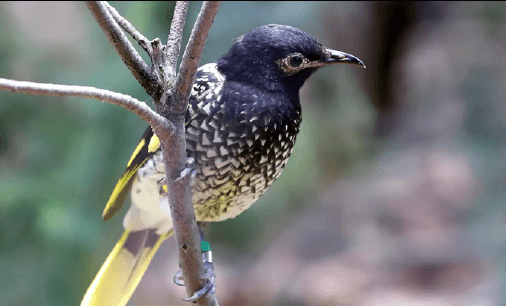 Just as humans learn languages,
animals learn behaviours crucial for
survival and reproduction from older,
experienced individuals of the same
species. In this way, important “cultures”
such as bird songs are passed
from one generation to the next.
But global biodiversity loss means
many animal populations are becoming
small and sparsely distributed.
This jeopardises the ability of young
animals to learn important behaviours.
Nowhere is this more true than in
the case of regent honeyeaters. In a
paper published today [March 16], we
describe how a population crash to
fewer than 300 has caused the species’
song culture to break down. In healthy populations, the song of
adult male honeyeaters is complex and
long. But where the population is very
small, the song is diminished and, in
many cases, the birds have adopted the
song of other species. Sadly, this makes
the males less attractive to females,
which may increase the chance the regent
honeyeater will become extinct. ...
As recently as the 1950s, regent
honeyeaters were a common sight in
suburban Melbourne and Sydney but
are now extremely rare in both cities.
Extensive postwar land clearing has
destroyed their habitat and caused the
population to ...
Read full text:
Just as humans learn languages,
animals learn behaviours crucial for
survival and reproduction from older,
experienced individuals of the same
species. In this way, important “cultures”
such as bird songs are passed
from one generation to the next.
But global biodiversity loss means
many animal populations are becoming
small and sparsely distributed.
This jeopardises the ability of young
animals to learn important behaviours.
Nowhere is this more true than in
the case of regent honeyeaters. In a
paper published today [March 16], we
describe how a population crash to
fewer than 300 has caused the species’
song culture to break down. In healthy populations, the song of
adult male honeyeaters is complex and
long. But where the population is very
small, the song is diminished and, in
many cases, the birds have adopted the
song of other species. Sadly, this makes
the males less attractive to females,
which may increase the chance the regent
honeyeater will become extinct. ...
As recently as the 1950s, regent
honeyeaters were a common sight in
suburban Melbourne and Sydney but
are now extremely rare in both cities.
Extensive postwar land clearing has
destroyed their habitat and caused the
population to ...
Read full text:

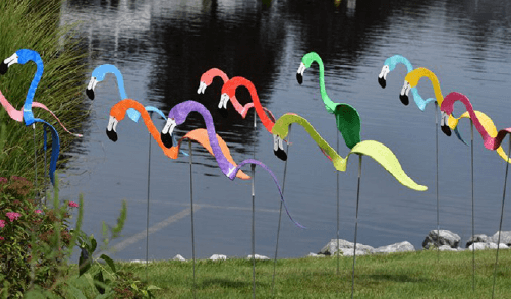 Since 2004, Florida Dancing Birds® has created birds
and critters that dance on the breeze, appear to saunter along,
and dip as if feeding. www.thegrommet.com
Since 2004, Florida Dancing Birds® has created birds
and critters that dance on the breeze, appear to saunter along,
and dip as if feeding. www.thegrommet.com
 Kit includes three 8.27
inches incense sticks
that will last two hours
each (Orange Blossom,
Grapefruit, Popcorn).
aromaria.mx
Kit includes three 8.27
inches incense sticks
that will last two hours
each (Orange Blossom,
Grapefruit, Popcorn).
aromaria.mx
 These
sets of six colorful silicone stacking coasters
feature varying geometric faceted edges that
create visual and tactile appeal. By Panisa
Khunprasert. store.moma.org
These
sets of six colorful silicone stacking coasters
feature varying geometric faceted edges that
create visual and tactile appeal. By Panisa
Khunprasert. store.moma.org
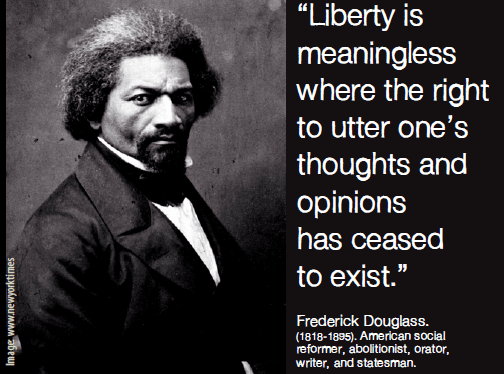
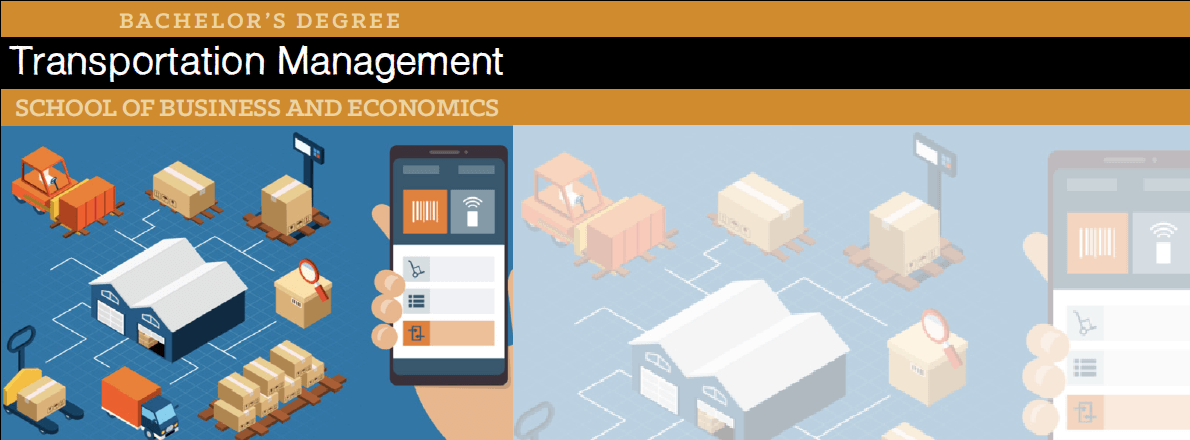 The Bachelor of Transportation
Management (BSc, BTM) program
helps students to understand the
principles, management, economics,
finances, and other issues associated
with the global air, maritime, logistics,
and transportation systems of the
world by providing them with tools
necessary to learn of the cutting-edge
processes, companies, and standards
associated with transportation and
Logistics and Supply Chain Management.
The Bachelor of Transportation
Management program is offered
online via distance learning. After
evaluating both academic record and
life experience, AIU staff working in
conjunction with Faculty and Academic
Advisors will assist students in
setting up a custom-made program,
designed on an individual basis. This
flexibility to meet student needs is seldom
found in other distance learning
programs. Our online program does
not require all students to take the
same subjects/courses, use the same
books, or learning materials. Instead,
the online Bachelor of Transportation
Management curriculum is designed
individually by the student and
academic advisor. It specifically addresses
strengths and weaknesses with
respect to market opportunities in the
student’s major and intended field of
work. Understanding that industry and
geographic factors should influence
the content of the curriculum instead
of a standardized one-fits-all design is
the hallmark of AIU’s unique approach
to adult education. This philosophy
addresses the dynamic and constantly
changing environment of working
professionals by helping adult students
in reaching their professional and
personal goals within the scope of the
degree program.
The Bachelor of Transportation
Management (BSc, BTM) program
helps students to understand the
principles, management, economics,
finances, and other issues associated
with the global air, maritime, logistics,
and transportation systems of the
world by providing them with tools
necessary to learn of the cutting-edge
processes, companies, and standards
associated with transportation and
Logistics and Supply Chain Management.
The Bachelor of Transportation
Management program is offered
online via distance learning. After
evaluating both academic record and
life experience, AIU staff working in
conjunction with Faculty and Academic
Advisors will assist students in
setting up a custom-made program,
designed on an individual basis. This
flexibility to meet student needs is seldom
found in other distance learning
programs. Our online program does
not require all students to take the
same subjects/courses, use the same
books, or learning materials. Instead,
the online Bachelor of Transportation
Management curriculum is designed
individually by the student and
academic advisor. It specifically addresses
strengths and weaknesses with
respect to market opportunities in the
student’s major and intended field of
work. Understanding that industry and
geographic factors should influence
the content of the curriculum instead
of a standardized one-fits-all design is
the hallmark of AIU’s unique approach
to adult education. This philosophy
addresses the dynamic and constantly
changing environment of working
professionals by helping adult students
in reaching their professional and
personal goals within the scope of the
degree program.
 Atlantic International University is accredited by the Accreditation Service for International
Schools, Colleges and Universities (ASIC). ASIC Accreditation is an internationally
renowned quality standard for colleges and universities. Visit ASIC’s Directory of Accredited
Colleges and Universities. ASIC is a member of CHEA International Quality Group
(CIQG) in the USA, an approved accreditation body by the Ministerial Department of the Home Office
in the UK, and is listed in the International Directory of the Council for Higher Education Accreditation
(CHEA). The University is based in the United States and was established by corporate charter in 1998.
Atlantic International University is accredited by the Accreditation Service for International
Schools, Colleges and Universities (ASIC). ASIC Accreditation is an internationally
renowned quality standard for colleges and universities. Visit ASIC’s Directory of Accredited
Colleges and Universities. ASIC is a member of CHEA International Quality Group
(CIQG) in the USA, an approved accreditation body by the Ministerial Department of the Home Office
in the UK, and is listed in the International Directory of the Council for Higher Education Accreditation
(CHEA). The University is based in the United States and was established by corporate charter in 1998.
 In some cases, accredited colleges
may not accept for transfer courses and degrees
completed at unaccredited colleges, and some
employers may require an accredited degree as
a basis for eligibility for employment. Potential
students should consider how the above may affect
their interests, AIU respects the unique rules and
regulations of each country and does not seek to
influence the respective authorities. In the event
that a prospective student wishes to carry out any
government review or process in regards to his
university degree, we recommend that the requirements
of such are explored in detail with the relevant
authorities by the prospective student as the
university does not intervene in such processes.
AIU students can be found in over 180 countries,
they actively participate and volunteer
in their communities as part of their academic
program and have allocated thousands of service
hours to diverse causes and initiatives. AIU
programs follow the standards commonly used by
colleges and universities in the United States with
regards to the following: academic program
structure, degree issued, transcript, and
other graduation documents.
AIU graduation documents can include
an apostille and authentication from the
US Department of State to facilitate their
use internationally.
In some cases, accredited colleges
may not accept for transfer courses and degrees
completed at unaccredited colleges, and some
employers may require an accredited degree as
a basis for eligibility for employment. Potential
students should consider how the above may affect
their interests, AIU respects the unique rules and
regulations of each country and does not seek to
influence the respective authorities. In the event
that a prospective student wishes to carry out any
government review or process in regards to his
university degree, we recommend that the requirements
of such are explored in detail with the relevant
authorities by the prospective student as the
university does not intervene in such processes.
AIU students can be found in over 180 countries,
they actively participate and volunteer
in their communities as part of their academic
program and have allocated thousands of service
hours to diverse causes and initiatives. AIU
programs follow the standards commonly used by
colleges and universities in the United States with
regards to the following: academic program
structure, degree issued, transcript, and
other graduation documents.
AIU graduation documents can include
an apostille and authentication from the
US Department of State to facilitate their
use internationally.
| Dr. Franklin Valcin President/Academic Dean |
Dr. José Mercado Chief Executive Officer Chairman of the Board of Trustees |
Ricardo González, PhD Provost |
| Dr. Ricardo Gonzalez Chief Operation Officer and MKT Director |
Linda Collazo Logistics Coordinator |
Dr. Silvia Restorff Academic Advisor |
| Dr. Miriam Garibaldi Viceprovost for Research |
Irina Ivashuk Alumni Association Coordinator |
Dr. Prakash Menon Academic Advisor |
| Dr. Ofelia Miller Director of AIU |
Clara Margalef Director of Special Projects of AIU |
Carlos Aponte Telecommunications Coordinator |
| Juan Pablo Moreno Director of Operations |
David Jung Corporate/Legal Counsel |
Dr. Nilani Ljunggren De Silva Academic Advisor |
| Paula Viera Director of Intelligence Systems |
Bruce Kim Advisor/Consultant |
Dr. Scott Wilson Academic Advisor |
| Felipe Gomez Design Director / IT Supervisor |
Thomas Kim Corporate/ Accounting Counsel |
Dr. Mohammad Shaidul Islam Academic Advisor |
| Daritza Ysla IT Coordinator |
Camila Correa Quality Assurance Coordinator |
Dr. Edgar Colon Academic Advisor |
| Nadeem Awan Chief Programming Officer |
Maricela Esparza Administrative Coordinator |
Deborah Rodriguez Academic Tutor Coordinator |
| Dr. Jack Rosenzweig Dean of Academic Affairs |
Chris Benjamin IT and Hosting Support |
Cyndy Dominguez Academic Tutor Coordinator |
| Dr. Edward Lambert Academic Director |
Mayra Bolivar Accounting Coordinator |
Kinmberly Diaz Admissions Support Tutor |
| Dr. Ariadna Romero Advisor Coordinator |
Roberto Aldrett Communications Coordinator |
Amalia Aldrett Admissions Coordinator |
| Nadia Gabaldon Academic Coordinator |
Giovanni Castillo IT Support |
Sandra Garcia Admissions Coordinator |
| Jhanzaib Awan Senior Programmer |
Jaime Rotlewicz Dean of Admissions |
Jose Neuhaus Admissions Support |
| Leonardo Salas Human Resource Manager |
Dr. Mario Rios Academic Advisor |
Junko Shimizu Admissions Coordinator |
| Benjamin Joseph IT and Technology Support |
Michael Phillips Registrar’s Office |
Veronica Amuz Admissions Coordinator |
| Rosie Perez Finance Coordinator |
Rene Cordon Admissions Support |
Alba Ochoa Admissions Coordinator |
| Chris Soto Admissions Counselor |
Jenis Garcia Admissions Counselor |
|
 The School of Business and Economics
allows aspiring and practicing
professionals, managers, and entrepreneurs
in the private and public sectors
to complete a self paced distance
learning degree program of the highest
academic standard.
The ultimate goal is to empower
learners and help them take advantage
of the enormous array of resources
from the world environment in order
to eliminate the current continuum of
poverty and limitations.
Degree programs are designed for
those students whose professional experience has been in business,
marketing, administration, economics,
finance and management.
The School of Business and Economics
allows aspiring and practicing
professionals, managers, and entrepreneurs
in the private and public sectors
to complete a self paced distance
learning degree program of the highest
academic standard.
The ultimate goal is to empower
learners and help them take advantage
of the enormous array of resources
from the world environment in order
to eliminate the current continuum of
poverty and limitations.
Degree programs are designed for
those students whose professional experience has been in business,
marketing, administration, economics,
finance and management.
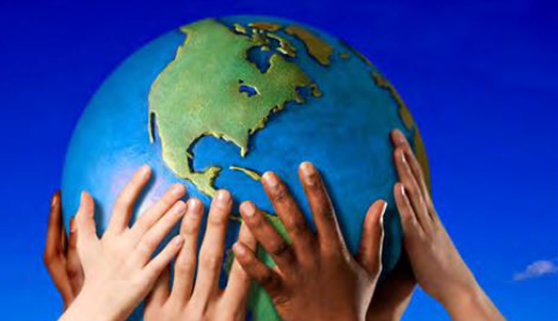 The School of Social and Human Studies
is focused on to the development of
studies which instill a core commitment
to building a society based on social and
economic justice and enhancing opportunities
for human well being.
The founding principles lie on the
basic right of education as outlined
in the Declaration of Human Rights.
We instill in our students a sense of
confidence and self reliance in their
ability to access the vast opportunities
available through information channels,
the world wide web, private, public,
nonprofit, and nongovernmental organizations in an ever expanding
global community.
Degree programs are aimed towards
those whose professional life has been
related to social and human behavior,
with the arts, or with cultural studies.
The School of Social and Human Studies
is focused on to the development of
studies which instill a core commitment
to building a society based on social and
economic justice and enhancing opportunities
for human well being.
The founding principles lie on the
basic right of education as outlined
in the Declaration of Human Rights.
We instill in our students a sense of
confidence and self reliance in their
ability to access the vast opportunities
available through information channels,
the world wide web, private, public,
nonprofit, and nongovernmental organizations in an ever expanding
global community.
Degree programs are aimed towards
those whose professional life has been
related to social and human behavior,
with the arts, or with cultural studies.
 The School of Science and Engineering
seeks to provide dynamic, integrated,
and challenging degree programs
designed for those whose experience
is in industrial research, scientific production,
engineering and the general
sciences. Our system for research and
education will keep us apace with the
twenty-first century reach scientific
advance in an environmentally and
ecologically responsible manner to allow
for the sustainability of the human
population. We will foster among our
students a demand for ethical behavior,
an appreciation for diversity, an understanding
of scientific investigation, knowledge of design innovation, a
critical appreciation for the importance
of technology and technological change
for the advancement of humanity.
The School of Science and Engineering
seeks to provide dynamic, integrated,
and challenging degree programs
designed for those whose experience
is in industrial research, scientific production,
engineering and the general
sciences. Our system for research and
education will keep us apace with the
twenty-first century reach scientific
advance in an environmentally and
ecologically responsible manner to allow
for the sustainability of the human
population. We will foster among our
students a demand for ethical behavior,
an appreciation for diversity, an understanding
of scientific investigation, knowledge of design innovation, a
critical appreciation for the importance
of technology and technological change
for the advancement of humanity.
 With access to a global catalog created and maintained collectively by more than
9,000 participating institutions, AIU students have secured excellent research
tools for their study programs.
With access to a global catalog created and maintained collectively by more than
9,000 participating institutions, AIU students have secured excellent research
tools for their study programs.